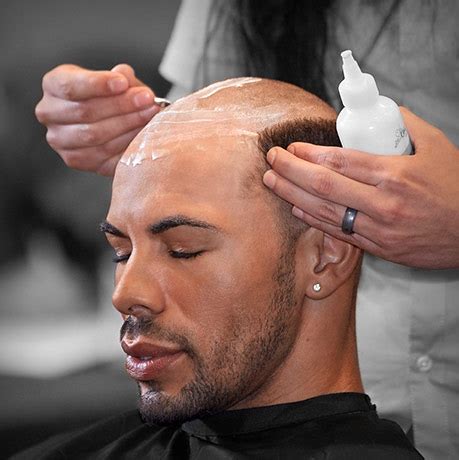Losing hair is a common concern for men of all ages. While there are many causes of hair loss, the most common is androgenetic alopecia, also known as male pattern baldness. This condition is caused by a combination of genetics and hormones, and it can lead to significant hair loss on the top of the head.

Hair replacement is a popular option for men who are looking to restore their hair. There are a variety of hair replacement methods available, including:
- Hair transplants: This is a surgical procedure in which hair follicles are taken from the back of the head and transplanted to the top of the head. Hair transplants are a permanent solution for hair loss, but they can be expensive and time-consuming.
- Hair plugs: This is a less invasive procedure than hair transplants, but it can also be less effective. Hair plugs are small cylinders of hair that are inserted into the scalp.
- Hair weaving: This is a non-surgical procedure in which human hair is woven into the existing hair on the head. Hair weaving can be a good option for men who want to add volume to their hair or cover up thinning areas.
- Hair extensions: This is a non-surgical procedure in which artificial hair is attached to the existing hair on the head. Hair extensions can be used to add length, volume, or color to the hair.
There are many reasons why men choose to get hair replacement. Some men want to improve their appearance, while others want to boost their confidence. Hair replacement can also help men to feel more youthful and vital.
Studies have shown that hair replacement can have a positive impact on men’s mental health. Men who get hair replacement are more likely to report feeling confident and attractive. They are also more likely to be satisfied with their lives overall.
There are many benefits to getting hair replacement. Some of the benefits include:
- Improved appearance: Hair replacement can help men to look younger, more attractive, and more confident.
- Increased confidence: Men who get hair replacement often report feeling more confident and outgoing.
- Enhanced quality of life: Hair replacement can help men to feel more fulfilled and satisfied with their lives.
- Permanent results: Hair transplants are a permanent solution for hair loss, which means that men can enjoy the benefits of hair replacement for years to come.
There are a few common mistakes that men make when getting hair replacement. These mistakes include:
- Choosing the wrong hair replacement method: There are a variety of hair replacement methods available, and not all methods are right for everyone. It is important to consult with a hair replacement specialist to determine the best method for your individual needs.
- Getting unrealistic expectations: Hair replacement is not a miracle cure for hair loss. It is important to have realistic expectations about the results you can expect.
- Not taking care of your hair replacement: Hair replacement requires some maintenance, such as washing and styling. It is important to follow the instructions of your hair replacement specialist to ensure that your hair replacement lasts as long as possible.
How much does hair replacement cost?
The cost of hair replacement varies depending on the method you choose and the extent of your hair loss. Hair transplants are typically the most expensive option, while hair weaving is the least expensive option.
How long does hair replacement last?
Hair transplants are a permanent solution for hair loss, but other methods of hair replacement typically last for 6-12 months.
Is hair replacement painful?
Hair transplants can be uncomfortable, but the pain is usually minimal. Other methods of hair replacement are not painful.
What are the risks of hair replacement?
Hair transplants can cause some side effects, such as scarring and infection. Other methods of hair replacement typically have no side effects.
How can I choose the right hair replacement specialist?
It is important to choose a hair replacement specialist who is experienced and qualified. You should also ask for referrals from friends or family members who have had hair replacement surgery.
- American Hair Loss Association
- International Society of Hair Restoration Surgery
- National Alopecia Areata Foundation
